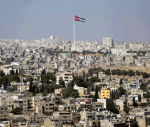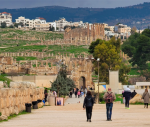You are here
‘Overcoming patriarchal mindsets key to ensuring women’s participation’
By Dana Al Emam - Jun 08,2015 - Last updated at Jun 08,2015
AMMAN — Enhancing equal rights and boosting women’s political and economic participation is not possible without a democratic basis that transforms these demands to popular ones, according to women leaders.
Speaking on Monday at the third coordination meeting of a project on the democratic reform process, Asma Khader, deputy chief commissioner of the Independent Elections Commission (IEC), highlighted “real democracy” as means to realise women’s rights.
The former minister said comprehensive and sustainable development is crucial for engaging men and women in policy making, citing a “quantitative and qualitative” advancement in women’s political participation in the Kingdom.
Although women make up some 25 per cent of the members of political parties, many of them were pushed to enrol by their male family members so that a party would have the minimum number of founding members to register.
“This explains the sharp increase in female members from five to 25 per cent in a short period of time,” Khader added, noting that some women, however, join political parties out of a real desire for participation.
Only six out of the country’s 37 political parties clearly mention gender equality and women’s rights in their programmes, according to the former senator, who added that “stereotypical” gender roles still govern the dynamics of political participation.
She cited a gap between political activity and people’s everyday lives, which feeds the perception of politics as an “elitist” sphere, adding that the engagement of political parties in regional issues has shifted the focus towards general public opinion issues.
Senator Taghreed Hikmat agreed with Khader, describing what has been done so far to increase women’s public and political participation as “below expectations” as they still are a minority in decision-making positions.
Calling on female voters to help women reach high positions, she noted that most political parties present “superficial” programmes that only engage women as voters.
Hikmat cited a number of challenges that hinder women’s political participation, including the patriarchal mindset, which is backed by educational and religious institutions, as well as the stereotypical view on gender roles and women’s economic dependency on men.
She called for reconsidering the Elections Law to give voters more than one vote, which would increase the chances of women being elected and encourage the creation of political coalitions.
Abla Abu Olbeh, secretary general of the Jordanian Democratic People’s Party (Hashed), noted that a few political parties in Jordan have “historically” adopted the plight of women and increasing their political participation.
She cited the “peaceful beginnings of the Arab Spring” as the first on-the-ground meeting of the public’s social and economic demands with those of women in the region.
Abu Olbeh, a member of the Royal committee to monitor and evaluate progress in implementing the National Integrity Charter, added that the ongoing deliberation of the political parties law includes calls that women fill 10 per cent of leading positions in parties, and constitute 25 per cent of members.
“It is important to target all women across the economic spectrum in Jordan in the attempts to enhance their political engagement,” the former MP noted.
In order to enhance women’s political participation at the grassroots level, General Federation of Jordanian Women President Nuha Maaytah called for allocating seats for women in the projected governorate councils under the draft decentralisation law.
She highlighted the importance of incorporating concepts of equality, justice and respect for the other in school curricula to instil these attitudes in the younger generation.
Monday’s discussion was part of the “Towards a Multi-Party Democracy: Strengthening the Role of Political Parties in Jordan’s Democratic Reform Process” project, co-funded by the EU and implemented by Al Quds Centre for Political Studies, the Konrad Adenauer Stiftung and the Jordanian Centre for Civic Education Studies.
Related Articles
AMMAN — Women’s rights activists on Saturday said many achievements were made since the Kingdom was founded 100 years ago, expressing hope t
The Independent Elections Commission (IEC) on Wednesday held a consultation meeting with a number of civil society organisations (CSOs) concerned with political work and the supervision of elections.
AMMAN — Women groups on Wednesday called for establishing a women’s parliamentarian committee to address the growing challenges women are fa














